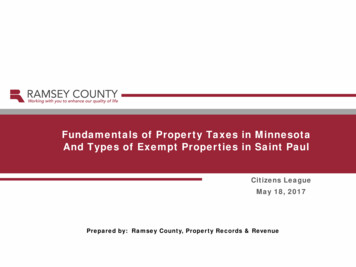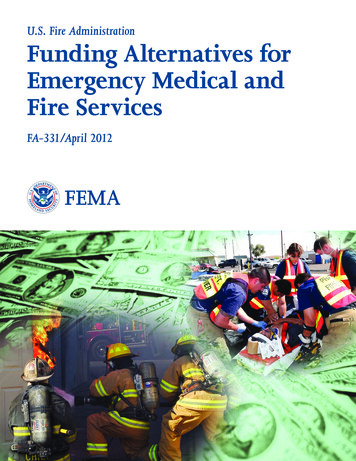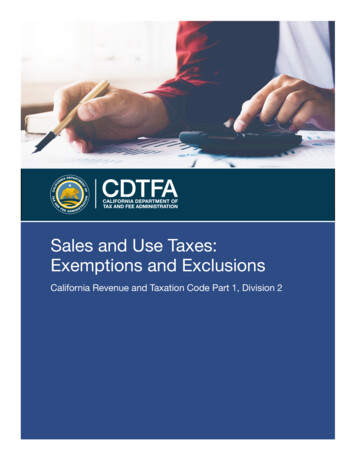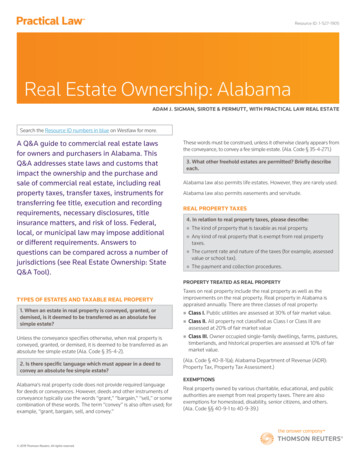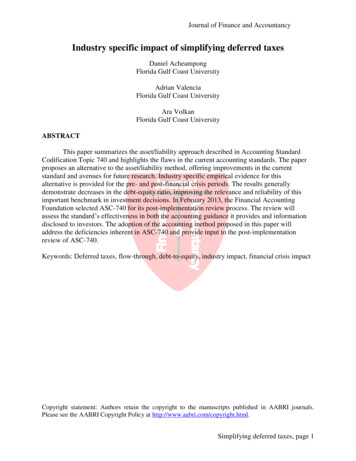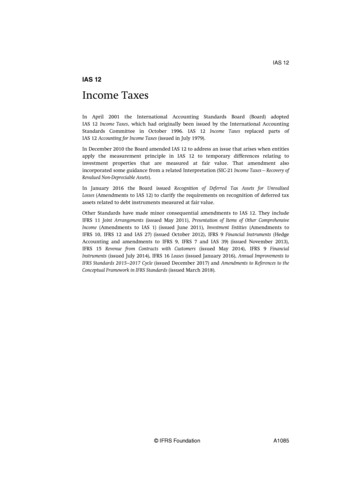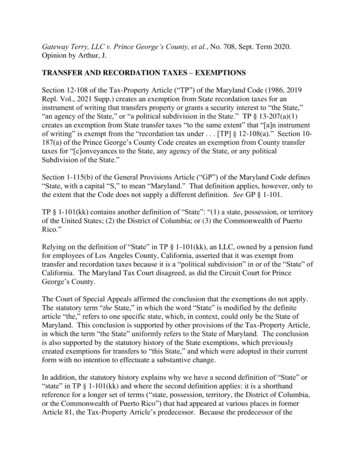
Transcription
Gateway Terry, LLC v. Prince George’s County, et al., No. 708, Sept. Term 2020.Opinion by Arthur, J.TRANSFER AND RECORDATION TAXES – EXEMPTIONSSection 12-108 of the Tax-Property Article (“TP”) of the Maryland Code (1986, 2019Repl. Vol., 2021 Supp.) creates an exemption from State recordation taxes for aninstrument of writing that transfers property or grants a security interest to “the State,”“an agency of the State,” or “a political subdivision in the State.” TP § 13-207(a)(1)creates an exemption from State transfer taxes “to the same extent” that “[a]n instrumentof writing” is exempt from the “recordation tax under . . . [TP] § 12-108(a).” Section 10187(a) of the Prince George’s County Code creates an exemption from County transfertaxes for “[c]onveyances to the State, any agency of the State, or any politicalSubdivision of the State.”Section 1-115(b) of the General Provisions Article (“GP”) of the Maryland Code defines“State, with a capital “S,” to mean “Maryland.” That definition applies, however, only tothe extent that the Code does not supply a different definition. See GP § 1-101.TP § 1-101(kk) contains another definition of “State”: “(1) a state, possession, or territoryof the United States; (2) the District of Columbia; or (3) the Commonwealth of PuertoRico.”Relying on the definition of “State” in TP § 1-101(kk), an LLC, owned by a pension fundfor employees of Los Angeles County, California, asserted that it was exempt fromtransfer and recordation taxes because it is a “political subdivision” in or of the “State” ofCalifornia. The Maryland Tax Court disagreed, as did the Circuit Court for PrinceGeorge’s County.The Court of Special Appeals affirmed the conclusion that the exemptions do not apply.The statutory term “the State,” in which the word “State” is modified by the definitearticle “the,” refers to one specific state, which, in context, could only be the State ofMaryland. This conclusion is supported by other provisions of the Tax-Property Article,in which the term “the State” uniformly refers to the State of Maryland. The conclusionis also supported by the statutory history of the State exemptions, which previouslycreated exemptions for transfers to “this State,” and which were adopted in their currentform with no intention to effectuate a substantive change.In addition, the statutory history explains why we have a second definition of “State” or“state” in TP § 1-101(kk) and where the second definition applies: it is a shorthandreference for a longer set of terms (“state, possession, territory, the District of Columbia,or the Commonwealth of Puerto Rico”) that had appeared at various places in formerArticle 81, the Tax-Property Article’s predecessor. Because the predecessor of the
current State statutes created an exemption for transfers to “this State,” and not to a“state, possession, territory, the District of Columbia, or the Commonwealth of PuertoRico,” the definition of “State” or “state” in TP § 1-101(kk) does not apply to thosestatutes.Finally, the Prince George’s County Code defines “State” to mean “the State ofMaryland.” Consequently, the County exemption does not apply to a transfer to an entitythat claims to be a political subdivision of a state other than the State of Maryland.
Circuit Court for Prince George’s CountyCase No. CAL19-37382REPORTEDIN THE COURT OF SPECIAL APPEALSOF MARYLANDNo. 0708September Term, 2020GATEWAY TERRY, LLCv.PRINCE GEORGE’S COUNTY, ET AL.Fader, C.J.,Arthur,Kenney, James A., III(Senior Judge, Specially Assigned),JJ.Opinion by Arthur, J.Filed: January 26, 2022* Beachley, J., did not participate in the Court’sdecision to designate this opinion forpublication pursuant to Md. Rule 8-605.1.Pursuant to Maryland Uniform Electronic LegalMaterials Act(§§ 10-1601 et seq. of the State Government Article) this document is authentic.2022-01-26 09:02-05:00Suzanne C. Johnson, Clerk
An LLC, owned by a pension fund for the employees of Los Angeles County,California, purchased real property in Prince George’s County. The LLC claimed astatutory exemption from State transfer and recordation taxes on the ground that it was “apolitical subdivision in the State.” See Md. Code (1986, 2019 Repl. Vol., 2021 Supp.), §12-108 of the Tax-Property Article (“TP”); TP § 13-207(a)(1). The LLC also claimed astatutory exemption from County transfer taxes on the ground that it was a “politicalsubdivision of the State.” See Prince George’s County Code § 10-187(a)(1).The Maryland Tax Court denied the LLC’s request for a refund, and the CircuitCourt for Prince George’s County affirmed the tax court’s decision.The LLC appealed. We too affirm.FACTUAL AND PROCEDURAL BACKGROUNDThis appeal involves pure questions of law. The material facts are not in dispute.Appellant Gateway Terry, LLC, is a California limited liability company, whollyowned and managed by the Los Angeles County Employees Retirement Association. InNovember 2017, Gateway Terry purchased Terrapin Row, a group of residentialcondominium units in College Park, for 186,460,000. After the sale, Gateway Terrypresented a deed, a deed of trust, and other related documents for recordation among theland records of Prince George’s County.Absent an exemption, a transferee, such as Gateway Terry, must pay State andlocal transfer and recordation taxes when it records certain documents among the landrecords. In general, the amount of taxes due depends on the consideration paid.
Using the figure of 186,460,000 as the consideration paid, the County’s Office ofFinance collected 2,610,440 in County transfer taxes and 1,025,530 in Staterecordation taxes. Using the same figure, the Clerk of the Circuit Court for PrinceGeorge’s County collected 932,300 in State transfer taxes.Gateway Terry applied for a refund. As grounds for the refund, Gateway Terryinvoked the exemption from State recordation and transfer taxes in the case of a transferto “the State[,] an agency of the State[,] or a political subdivision in the State.” See TP §12-108; TP § 13-207(a)(1). In addition, Gateway Terry invoked the exemption fromCounty transfer taxes for “[c]onveyances to the State, any agency of the State, or anypolitical Subdivision of the State.” See Prince George’s County Code § 10-187(a)(1).Gateway Terry argued that, as an LLC whose sole owner was a public pension fund foremployees of a local government in the State of California, it qualified as a politicalsubdivision in or of “the State.” Both the County and the State of Maryland denied therequest for a refund.Gateway Terry appealed to the Maryland Tax Court, arguing that it was entitled tothe exemptions. The court convened a hearing, at which the Gateway Terry and thetaxing authorities, Prince George’s County and the State of Maryland, debated the correctinterpretation of the term “the State” in the applicable statutes.At the end of the hearing, the court held the record open to allow the parties tosubmit materials pertaining to the legislative history of the term “the State.” GatewayTerry submitted additional materials, but those materials did not concern the legislativehistory. Instead, the materials raised a new question about whether the State had2
discriminated against foreign LLCs like Gateway Terry, in violation of principles ofequal protection, by requiring them to pay transfer and recordation taxes while exemptingagencies and political subdivisions of the State of Maryland.The tax court issued a memorandum opinion and order, affirming the decisions todeny the tax exemptions. The court held that, under the applicable statutes, the term “theState” refers to the State of Maryland and to no other state. Because Gateway Terry isnot a political subdivision in or of the State of Maryland, the court held that it does notqualify for the exemptions. The tax court also held that, even if the exemptions appliedto a transfer to a state other than the State of Maryland (or to an agency or politicalsubdivision of a state other than the State of Maryland), Gateway Terry could not claimthe exemption, because it is not a political subdivision of the State of California. The taxcourt did not address the equal protection argument that Gateway Terry raised in thesupplemental submission that it filed after the hearing.Gateway Terry petitioned for judicial review in the Circuit Court for PrinceGeorge’s County, which affirmed the tax court’s decision. Like the tax court, the circuitcourt did not consider the equal protection argument.Gateway Terry noted this timely appeal.QUESTIONS PRESENTEDGateway Terry has submitted three questions, which we have reworded as follows:1. Did the Tax Court err as a matter of law in determining that “the State”in § 12-108(a)(1) of the Tax-Property Article referred to the State ofMaryland and not to any other state?3
2. Did the Tax Court err as a matter of law in determining that GatewayTerry is not an agency or political subdivision of the State of California?3. Did the Tax Court err as a matter of law in determining that GatewayTerry was not exempt from Prince George’s County’s transfer tax? 1We shall hold that Gateway Terry is not a political subdivision in or of “the State,”within the meaning of the statutory exemptions. In view of our disposition of thoseissues, we need not address whether an LLC, which is owned by a pension fund foremployees of a local government in another state, is a “political subdivision” of that state.DISCUSSIONA.Scope of Review of the Tax Court’s Decision“The Tax Court is ‘an adjudicatory administrative agency in the executive branchof state government.’” Frey v. Comptroller, 422 Md. 111, 136 (2011) (quotingFurnitureland S., Inc. v. Comptroller, 364 Md. 126, 137 n.8 (2001)); accord Gore Enter.1The questions from Gateway Terry’s brief are:1. Whether the plain meaning of “State” in Section 12-108(a) of the TaxProperty Article of the Code of Maryland is unambiguously provided bythe specific and express definition of “State” in Section 1-101(kk) of theTax-Property Article of the Code of Maryland?2. Whether a limited liability company wholly owned by a governmental bodyis exempt under Section 12-108(a) of the Tax-Property Article of the Codeof Maryland, where such company is disregarded for tax purposes andsimilarly situated companies owned by the Maryland State Retirement andPension System have historically been exempted from taxation?3. Whether Prince George’s County’s transfer tax is subject to and should beconstrued together with the exemptions and definitions provided by thegeneral public laws governing transfer taxes in the Tax-Property Article ofthe Code of Maryland?4
Holdings, Inc. v. Comptroller, 437 Md. 492, 503 (2014). “As such, the Tax Court issubject to the same standards of judicial review as other administrative agencies.” Freyv. Comptroller, 422 Md. at 136; see Comptroller v. Johns Hopkins Univ., 186 Md. App.169, 181 (2009). “We review the decision of the Tax Court, not the ruling of the circuitcourt.” Comptroller v. Johns Hopkins Univ., 186 Md. App. at 181; accord Blue BuffaloCo. v. Comptroller, 243 Md. App. 693, 701 (2019).Because the tax court’s decision involves a pure question of law concerning themeaning of the State and County enactments, we review it without deference. See BlueBuffalo Co. v. Comptroller, 243 Md. App. at 702. Although we are directed to place“‘great weight’” on the tax court’s interpretations of the statutes and regulations that itadministers (id. (quoting Gore Enter. Holdings, Inc. v. Comptroller, 437 Md. at 505)),“[t]his principle is limited by the ‘plain meaning’ rule of interpretation; that is ‘wherethere is no ambiguity and the words of the statute are clear, we simply apply the statute asit reads.’” Id. (quoting Frey v. Comptroller of Treasury, 422 Md. at 182). As the Countyand the State point out, however, “it is well settled that tax-exemption statutes are to bestrictly construed in favor of the taxing authority.” Supervisor of Assessments ofBaltimore Cnty. v. Keeler, 362 Md. 198, 209 (2001).B.The Statutory ExemptionsThis case turns on the interpretation of three enactments: TP § 12-108(a)(1), TP §13-207(a)(1), and § 10-187(a) of the Prince George’s County Code.TP § 12-108(a)(1) creates an exemption from State recordation taxes for aninstrument of writing that transfers property or grants a security interest to “the State,”5
“an agency of the State,” or “a political subdivision in the State.” TP § 13-207(a)(1)creates an exemption from State transfer taxes “to the same extent” that “[a]n instrumentof writing” is exempt from the “recordation tax under . . . [TP] § 12-108(a).” Section 10187(a) of the Prince George’s County Code creates an exemption from County transfertaxes for “[c]onveyances to the State, any agency of the State, or any politicalSubdivision of the State.” Thus, in the case of each enactment, the availability of theexemption depends, directly or indirectly, on whether the transferee is “the State,” “anagency of the State,” or a “political subdivision” in or of “the State.”Gateway Terry contends that it is entitled to the exemptions because, it says, it is apolitical subdivision in or of “the State.” The validity of that contention depends, in part,on competing definitions of the term “State” or “state” in the Maryland Code.The General Provisions Article of the Code supplies a number of definitions thatapply throughout the Code in its entirety, except as otherwise provided. Md. Code (2014,2019 Repl. Vol.), § 1-101 of the General Provisions Article (“GP”). GP § 1-115(a)defines the term “state,” with a lower case “s,” to mean:(1) a state, possession, territory, or commonwealth of the United States; or(2) the District of Columbia.By contrast, GP § 1-115(b) defines the term “State, with a capital “S,” to mean“Maryland.”The Tax-Property Article, however, contains another definition of “State.”According to TP § 1-101(kk):“State” means:6
(1) a state, possession, or territory of the United States;(2) the District of Columbia; or(3) the Commonwealth of Puerto Rico.2Relying on TP § 1-101(kk), Gateway Terry argues that the term “State” in TP §12-108(a)(1) includes any one of the 50 American states, as well as their politicalsubdivisions. Because Gateway Terry claims to be a political subdivision of the State ofCalifornia, it concludes that it was entitled to the exemptions in TP § 12-108(a)(1) and §10-187(a) of the Prince George’s County Code. Similarly, Gateway Terry concludes itwas entitled to the exemption in TP § 13-207(a)(1), which applies “to the same extent”that “[a]n instrument of writing” is exempt under TP § 12-108(a).C.Principles of Statutory Construction“‘When we are called upon to interpret any statute, we first examine the ordinarymeaning of the enacted language, reading the statute as a whole to avoid an interpretationthat might nullify another part of the statute.’” Martinez v. Ross, 245 Md. App. 581, 590(2020) (quoting Richard Beavers Constr., Inc. v. Wagstaff, 236 Md. App. 1, 14 (2018)),cert. denied, 469 Md. 656 (2020). “‘[T]o understand the meaning of statutory language,we must look beyond individual words and clauses to the larger context, including othersurrounding provisions and the apparent purpose of the enactment.’” Id. at 591 (quotingTrim v. YMCA of Cent. Maryland, 233 Md. App. 326, 334-35 (2017)); accord Maryland2In addition to Puerto Rico, the possessions or territories of the United Statesinclude American Samoa, Guam, the Northern Mariana Islands, and the U.S. VirginIslands. articles/2018/SL 0118Stats.pdf.7
Office of People’s Counsel v. Maryland Pub. Serv. Comm’n, 226 Md. App. 483, 509(2016). “We do ‘not read statutory language in a vacuum, nor do we confine strictly ourinterpretation of a statute’s plain language to the isolated section alone.’” Id. at 591(quoting Lockshin v. Semsker, 412 Md. 257, 275 (2010)).D.The State ExemptionsWe begin with the plain meaning of TP § 12-108(a)(1). It provides:Except as provided in paragraph (2) of this subsection, an instrument ofwriting is not subject to recordation tax, if the instrument of writingtransfers property to or grants a security interest to:(i) the United States;(ii) the State;(iii) an agency of the State; or(iv) a political subdivision in the State.Although the General Provisions Article defines the term “State,” with a capital“S,” to mean the State of “Maryland” (GP § 1-115(b)), Gateway Terry argues, with someforce, that that general definition applies only if another definition is not “otherwiseprovided.” GP § 1-101. Gateway Terry points out that the Tax-Property Article providesits own definition of “State” or “state,” and that the definition includes “a state . . . of theUnited States.” TP § 1-101(kk). Gateway Terry concludes that, in determining the8
meaning of the term “State” in TP § 12-108(a)(1), a court must apply the definition in theTax-Property Article.3In holding that the plain meaning of the term “the State” refers to the State ofMaryland, and not to any other State in the United States, the tax court relied on thepresence of the definite article “the,” which modifies the word “State” in § 12-108(a)(1):“an instrument of writing is not subject to recordation tax, if the instrument of writingtransfers property to or grants a security interest to . . . the State.” (Emphasis added.)The tax court reasoned that because the statute refers to “the” State rather than “a” Stateor state, the legislature must have intended the statute to refer to only one, specific state,namely, the State of Maryland. We agree.“The articles ‘a’ or ‘an’ are indefinite articles, in contrast to the definite article‘the.’” Evans v. State, 396 Md. 256, 341 (2006). “Most courts have construed ‘a’ or ‘an’as meaning ‘any’ and as not restricted to just one.” Id.; Payne v. State, 243 Md. App.465, 486 (2019). By contrast, the definite article “‘the’ refers to a certain object.”Black’s Law Dictionary 1324 (5th ed. 1984); accord Webster’s Encylopedic UnabridgedDictionary of the English Language 1470 (1989) (stating that “the” is “used, esp. before aGateway Terry assumes that TP § 1-101(kk) defines the term “State,” with acapital “S.” It is, however, less than entirely clear that the assumption is correct. In TP §1-101(kk), the defined term is “State,” with a capital “S,” but that is because “State” isthe first word in the sentence, which, in ordinary English usage, is capitalized.Furthermore, in explicating the meaning of the defined term, TP § 1-101(kk) uses theword “state,” with a lower case “s.” In accordance with the convention for legislation, allof the words in the statute were capitalized in the bill that the General Assembly passed.1985 Md. Laws ch. 8, at 57.39
noun, with a specifying or particularizing effect, as opposed to the indefinite orgeneralizing force of the indefinite article a or an”).The use of the definite article “the” in § 12-108(a)(1) demonstrates that the term“the State” refers only to the State of Maryland. In creating this exemption for transfersto “the State,” an agency of “the State,” or a political subdivision in “the State,” theGeneral Assembly expressed its intention to limit the exemption to one, specific andparticular State, which, in context, could only mean the State of Maryland. The statutoryexemption for “the State” does not extend to all 50 American states.4Had the General Assembly intended to exempt conveyances to any one of the 50states (and to their agencies and political subdivisions), it could easily have done so byemploying the phrase “a state” or “a State,” rather than “the State.” As the County andthe State astutely point out in their brief, “California is a state, not the State.” (Emphasisin original.) The exemption for transfers to “the State” does not apply to transfers toCalifornia, or to its agencies or political subdivisions.Gateway Terry responds by dismissing the importance of the definite articlepreceding “State.” It invokes the interpretational rule that “[t]he singular includes theplural and the plural includes the singular” (GP § 1-202) to argue that the term “the State”includes any of the American states.4The parties do not discuss the policy behind the exemptions in TP § 12-108(a)(1)and TP § 13-207(a)(1), but one obvious rationale is to avoid the absurd situation in whichthe State of Maryland (or one of its agencies or political subdivisions) would be requiredto pay State recordation and transfer taxes to the State itself.10
Gateway Terry does not fully develop its argument, but it appears to envision thatunder § 12-108(a)(1) the exemption would apply to transfers to “the States” (or toagencies or political subdivisions of “the States”), as the term “State” or “state” is definedin TP § 1-101(kk). Under Gateway Terry’s formulation, however, the definite article“the” would refer to “States” collectively. Hence, under this formulation, the exemptionwould seem to apply only in the case of a transfer to all of “the States” (or to an agencyor political subdivision of all of “the States”), an unlikely event. We reject GatewayTerry’s formulation as implausible.In any event, by making “the State” plural, Gateway Terry does not get where itneeds to go, which is to transform an exemption for transfers to “the State” into anexemption for transfers to “a State” or to “any State.” The definite article (“the”) doesnot become an indefinite article (“a”) when the noun that it modifies (here, “State”)becomes plural. A transfer to “a State” is not a transfer to “the State.”Our conclusion, that “the State” means the State of Maryland, is supported byother uses of the term “the State” in the Tax-Property Article. For example, TP § 1-304directs the Comptroller to pay the taxes that he collects into “the Treasury of the State”; itis rather obvious that the Comptroller is to pay these taxes into the Treasury of the Stateof Maryland, and not the Treasury of some other state. TP § 3-105 states that membersof property-tax assessment appeal boards are entitled to compensation “at an hourly rateas provided in the State budget”; it is equally obvious that the board members are entitledto compensation at the hourly rate provided in the budget of the State of Maryland, andnot the budget of some other state. Finally, TP § 14-1015 imposes criminal liability on11
“[a]n officer or employee of the State . . . who negligently fails to perform a duty or to doany act required in” the Tax-Property Article; it is also obvious the statute applies toofficers or employees of the State of Maryland, and not to officers or employees of someother state (as they have no duties or obligations under the Tax-Property Article). Inshort, when the Tax-Property Article uses the term “the State,” with a definite article anda capital “S,” it uniformly refers to the State of Maryland.5As the tax court recognized, the statutory history of the Tax-Property Articleprovides additional confirmation that the term “the State” in § 12-108(a)(1) refers to theState of Maryland, and not to any other state. The statutory history also providesadditional confirmation that the broader definition of “State” or “state” in TP § 1-101(kk)does not apply to § 12-108(a)(1).Statutory history is “quite separate from legislative history.” Antonin Scalia &Bryan A. Garner, Reading Law: The Interpretation of Legal Texts, 256 (2012).Legislative history “consists of the hearings, committee reports, and debate leading up tothe enactment in question.” Id.; see also Hackley v. State, 161 Md. App. 1, 14 (2005),aff’d, 389 Md. 387 (2005) (legislative history refers to “‘the derivation of the statute,In its brief, Gateway Terry tends to ignore the definite article “the” in § 12108(a)(1). For example, in the first of its questions presented, Gateway Terry asks“[w]hether the plain meaning of ‘State’ in Section § 12-108(a) of the Tax-PropertyArticle of the Code of Maryland is unambiguously provided by the specific and expressdefinition of ‘State’ in Section 1-101(kk) of the Tax-Property Article of the Code ofMaryland?” In developing its argument, Gateway Terry asserts that “[t]he term ‘State’ isnot defined in any other provision of Tax[-] Property Article,” aside from TP § 1101(kk). Similarly, Gateway Terry criticizes the tax court for holding that the term‘State’ in Section 12-108 exclusively refers to Maryland.”512
comments and explanations regarding it by authoritative sources during the legislativeprocess, and amendments proposed or added to it’”) (quoting Boffen v. State, 372 Md.724, 736-37 (2003)). By contrast, statutory history consists of the “statutes repealed oramended by the statute under consideration.” Antonin Scalia & Bryan A. Garner,Reading Law: The Interpretation of Legal Texts, supra, 256. Those statutes “form part ofthe context of the statute” under consideration and “can properly be presumed to havebeen before all the members of the legislature when they voted.” Id.The General Assembly adopted TP § 12-108 in 1985, as part of the recodificationof former Article 81 into the new Tax-Property Article. In the recodification, thelegislature repealed Article 81, § 277, which had created an exemption for “conveyancesto: (1) This State; (2) Any agency of this State; or (3) Any political subdivision of thisState.” The legislature replaced Article 81, § 277, with TP § 12-108(a), in which thewords “this State” were changed to “the State.” The revisor’s note indicates that thesubstitution of “the State” for “this State” was not intended to effectuate a substantivechange. 1985 Md. Laws ch. 8, at 451-52. Thus, the revisor’s note, which is anexpression of legislative intent on which we may rely,6 confirms the tax court’s“‘It is a well-settled practice of this Court to refer to the Revisor’s Notes whensearching for legislative intent of an enactment.’” Comptroller of Treasury v. Blanton,390 Md. 528, 538 (2006) (quoting Dean v. Pinder, 312 Md. 154, 163 (1988)); see alsoKane v. Schulmeyer, 349 Md. 424, 435, 437 (1998) (noting that “a fair indication oflegislative intent . . . is unmistakably revealed . . . in the Revisor’s Note”); Murray v.State, 27 Md. App. 404, 409 (1975) (relying on revisor’s note as an indication oflegislative intent).613
conclusion that the words “the State” in § 12-108(a) mean the same thing as the words“this State” in former Article 81, § 277: the State of Maryland.7The statutory history of the Tax-Property Article also explains why we have asecond definition of “State” or “state” in TP § 1-101(kk) and where the second definitionapplies. That definition, too, became part of Maryland law in 1985 as part of therecodification of former Article 81 into the Tax-Property Article. The revisor’s noteexplains that the definition of “State” or “state” in TP § 1-101 was “new language addedto avoid repetition of phrases such as ‘state, possession, territory, the District ofColumbia, or the Commonwealth of Puerto Rico.” 1985 Md. Laws ch. 8, at 57, 600. Inother words, the definition of “State” or “state” in TP § 1-101 is a shorthand reference fora longer set of terms that had appeared at various places in former Article 81.None of those terms appeared in the predecessor of TP § 12-108(a), Article 81, §277. Article 81, § 277, referred to a conveyance to “this State”; it did not refer toconveyances to a “state, possession, territory, the District of Columbia, or theCommonwealth of Puerto Rico.” Consequently, the definition of “State” or “state” in TP§ 1-101(kk) has no place in TP § 12-108(a).Gateway Terry complains that the tax court erred in looking to “legislativehistory” to interpret an unambiguous statute. The complaint has no foundation.Although the tax court said that it was looking to “legislative history,” it was, in fact,examining the statutory history of the Tax-Property Article. In any event, “even when[statutory] language is unambiguous, it is useful to review legislative history of thestatute to confirm that interpretation and to eliminate another version of legislative intentalleged to be latent in the language.” State v. Roshchin, 446 Md. 128, 140 (2016).Hence, the tax court would not have erred in considering legislative history had it doneso.714
To put it another way, the Tax-Property Article does not “otherwise provide[]”(GP § 1-101) a definition for the term “the State”; thus, the general definition in GP § 1115(b) continues to apply. “[T]he State,” in TP § 12-108(a), means “Maryland.” GP § 1115(b). Accordingly, the exemption in TP § 12-108(a) applies only to an instrument ofwriting that transfers property or grants a security interest to the State of Maryland, itsagencies, or its political subdivisions. And because TP § 13-207(a)(1) applies “to thesame extent” that “[a]n instrument of writing” is exempt from taxation under TP § 12108(a), it too applies only to an instrument of writing that transfers property or grants asecurity interest to the State of Maryland, its agencies, or its political subdivisions.E.The County ExemptionGateway Terry also argues that the tax court erred in determining that it was notexempt from Prince George’s County’s County transfer tax. This argument has no moremerit than its argument concerning the State transfer and recordation taxes.Prince George’s County Code § 10-187(a)(1) states that “Conveyances to theState, any agency of the State, or any political Subdivision of the State shall not besubject to the tax imposed under this Section.” Section 10-102(33) of the PrinceGeorge’s County Code defines the term “State” to mean “the State of Maryland.” By itsterms, therefore, § 10-187(a)(1) creates an exemption only for conveyances to the Stateof Maryland, an agency of the State of Maryland, or a political subdivision of the State ofMaryland. It does not create an exemption for conveyances to another state, to an agencyof another state, to a political subdivision of another state, or to an LLC that is owned bya pension fund for employees of a
TRANSFER AND RECORDATION TAXES - EXEMPTIONS Section 12-108 of the Tax-Property Article ("TP") of the Maryland Code (1986, 2019 Repl. Vol., 2021 Supp.) creates an exemption from State recordation taxes for an instrument of writing that transfers property or grants a security interest to "the State,"

